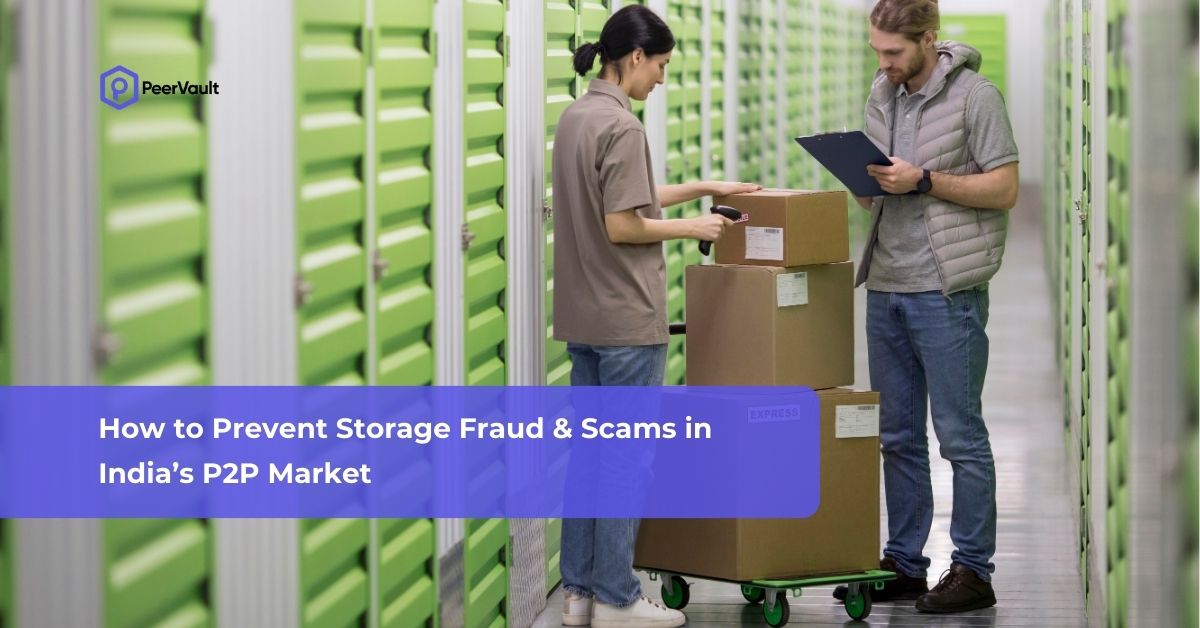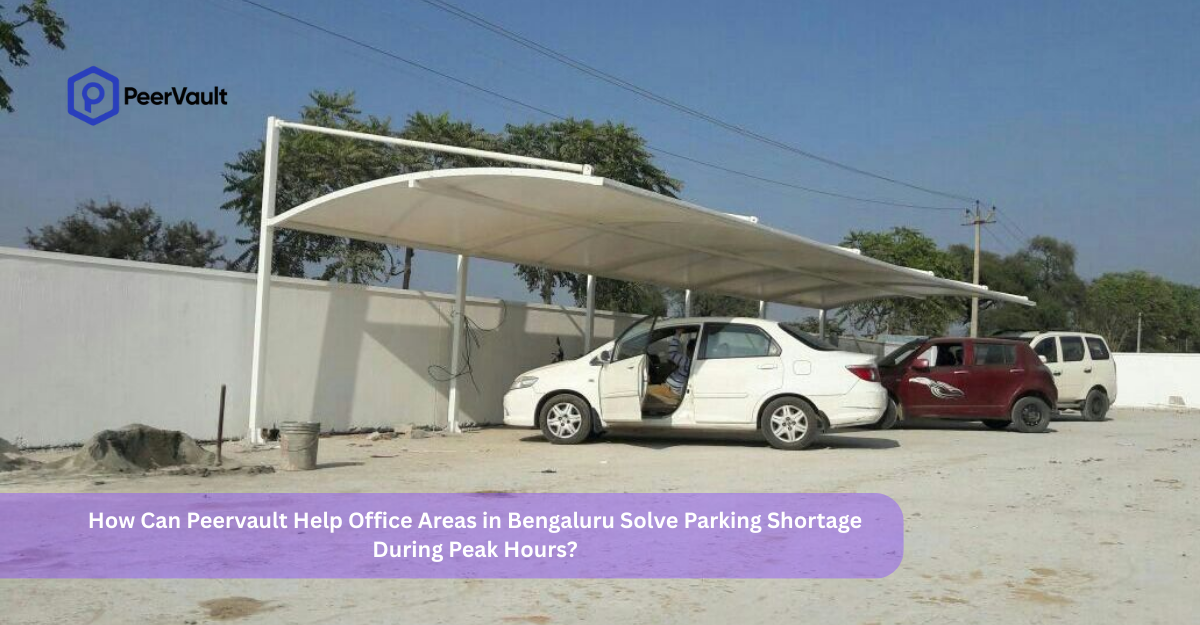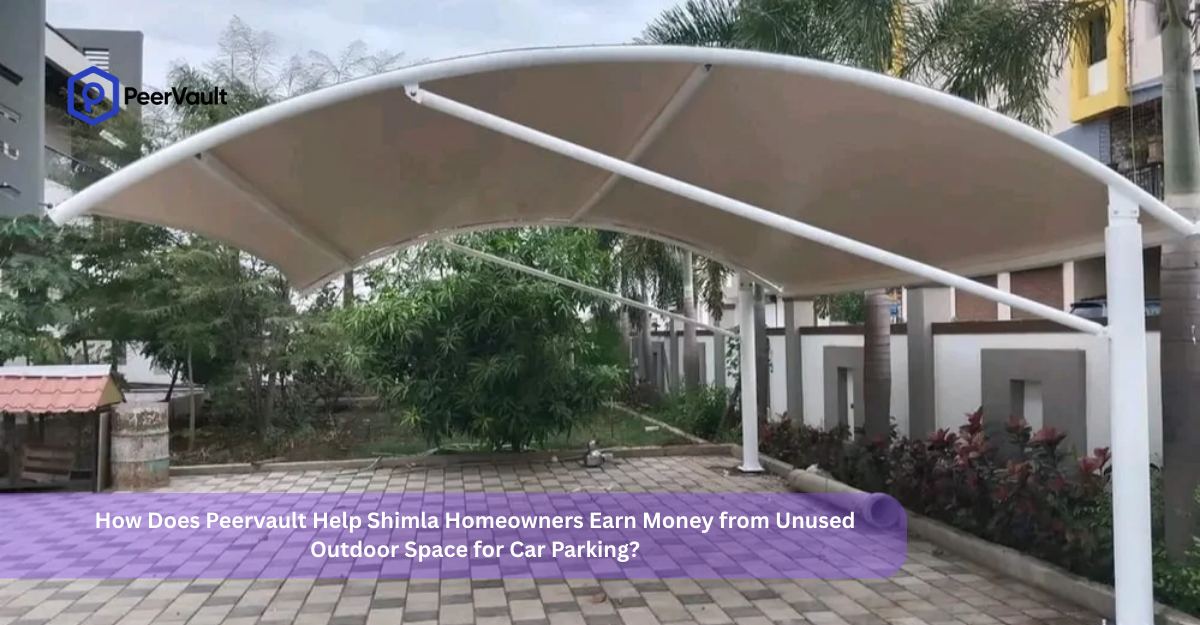How to Avoid Storage Fraud and Scams in the P2P Market in India

Peer-to-peer (P2P) self-storage is expanding quickly in India, where platforms such as PeerVault link space providers with storage seekers. Although this strategy provides flexible and affordable storage options, it also increases the risk of fraud and frauds. User trust can be weakened by storage fraud, which can lead to monetary losses, stolen products, or hazardous storage conditions.
It is essential to recognize fraudulent activities and take preventative action in order to create a safe and dependable ecology. This paper examines typical storage scams in the P2P market in India, describes risk-reduction best practices, and offers platforms and users concrete actions to improve security.
Typical Storage Fraud Types in the P2P Market in India
1. Phishing scams and fraudulent listings
In order to trick unwary people, scammers frequently fabricate listings with alluring rental prices. Before letting tenants use the storage area, they could ask for payment in advance. Phishing techniques are sometimes used by scammers to get private information, such as identity credentials or financial information.
Ways to Avoid:
- Verify a listing’s legitimacy before paying for it.
- When discussing rental agreements, use the official platform’s communication methods.
- Never send private information by email or on unprotected websites.
2. Theft and Unauthorized Access
Unverified hosts run the risk of misusing stored materials, letting unauthorized people access them, or even stealing priceless items. This poses a serious concern, especially in cases when storage areas are not well secured.
Ways to Avoid:
- Select storage companies with positive evaluations and confirmed IDs.
- Choose storage areas that have digital access logs and CCTV supervision.
- To protect against possible losses due to damage or theft, insure precious items.
3. Payment fraud and hidden charges
After obtaining a renter’s commitment, some dishonest hosts add hidden costs while advertising affordable rental prices. Others might employ fraudulent payment methods, endangering the financial stability of authorized users.
Ways to Avoid:
- Before accepting a storage rental, carefully review the terms and conditions.
- Make use of systems that enable payments via safe channels.
- For record-keeping purposes, insist on digital transactions rather than direct cash payments.
4. False Advertising of Storage Areas
Hosts may overstate or mislead the amount of storage space they have, promoting secure, climate-controlled facilities while providing inadequate, badly kept spaces. This may result in compromised or ruined products.
How to Prevent:
- Request a live video tour or an in-person inspection before booking.
- Look for real customer testimonials and feedback.
- Use platforms that enforce penalties for misrepresentation.
5. Identity Fraud and Fake Reviews
Some scammers create fake profiles to appear credible. They may also post false reviews to manipulate ratings, misleading users into trusting unreliable providers.
How to Prevent:
- Platforms should verify users through government-issued IDs (Aadhaar, PAN, Passport).
- Encourage users to report suspicious profiles or activities.
- Cross-check reviews across multiple sources before making a decision.
Preventive Measures to Avoid Storage Fraud
1. Rigorous Verification Processes
P2P storage platforms should implement stringent verification methods, including:
- Identity Verification: Using KYC (Know Your Customer) protocols.
- Proof of Ownership: Ensuring hosts provide property documents.
- Background Checks: Screening for past fraudulent activities.
2. Conduct Thorough Inspections
Before renting a storage space, users should:
- Physically inspect the facility or request a live virtual tour.
- Ensure the space meets security and hygiene standards.
- Verify access control measures to prevent unauthorized entry.
3. Secure Payment Methods
P2P platforms should mandate payments through secure, platform-integrated gateways to prevent fraud. Renters should:
- Avoid direct payments via third-party apps or cash transactions.
- Look for escrow services where payments are held until conditions are met.
4. Utilize Smart Contracts
Blockchain-based smart contracts can enhance transparency and security by automating rental agreements. These contracts ensure:
- Payments are released only after conditions are fulfilled.
- Agreements cannot be tampered with post-signing.
- A transparent and immutable record of transactions is maintained.
5. AI-Powered Fraud Detection
Artificial intelligence (AI) should be used by P2P storage services in order to:
- Detect and remove fake reviews.
- Identify suspicious user activity patterns.
- Monitor payment inconsistencies for potential fraud.
6. Transparent Policies and Dispute Resolution
Users should choose platforms with clear guidelines on:
- Refund Policies: Understand cancellation terms and refund eligibility.
- Liability Coverage: Know who is responsible for damages or theft.
- Dispute Resolution: Ensure platforms offer arbitration or customer support.
7. Enhanced Security Measures
P2P storage providers should prioritize security. Effective security measures include:
- 24/7 CCTV Monitoring: Helps track activities and deter theft.
- Tamper-Proof Locks: Ensures secure storage.
- Access Control Systems: Restricts unauthorized entry.
- Insurance Coverage: Protects against unforeseen damages.
8. Educating Users on Fraud Awareness
P2P storage platforms should educate users about potential scams through:
- Blog posts, newsletters, and educational videos.
- Warning notifications when suspicious activities are detected.
- Guidelines on safe transactions and secure storage practices.
Legal and Regulatory Considerations
The Indian government may introduce regulations to enhance security and standardization in the P2P self-storage industry. Potential legal measures include:
- Mandatory KYC for all users: Ensuring all transactions involve verified individuals.
- Consumer protection laws: Providing legal recourse in case of fraud.
- Legal frameworks for rental agreements: Establishing standardized contract terms.
Platforms should work with law enforcement to create industry best practices that guarantee adherence to cybersecurity and data protection regulations.
Case Studies: Learning from Real Incidents
Case Study 1: Fake Listings Scam
A user in Mumbai was lured by an extremely low rental price on an independent listing outside a platform. The fraudster asked for an advance payment but disappeared after receiving the funds. The victim had no way to recover the lost money since the transaction was done informally.
Lesson Learned:
Always use a trusted P2P storage platform that offers secure transactions and verified listings.
Case Study 2: Unauthorized Access
A renter in Delhi stored valuable office documents in a shared storage space, only to discover they were accessed by unauthorized individuals. The storage owner had sublet the space to multiple people without informing the renter.
Lesson Learned:
Always check for restricted access protocols and choose spaces with CCTV monitoring.
Conclusion
India’s P2P self-storage market presents immense opportunities, but users must remain vigilant against fraud and scams. Platforms like PeerVault can ensure a secure environment by implementing strong verification, secure payment methods, transparent policies, and proactive user education.
By prioritizing trust, transparency, and security, the P2P storage industry can continue to thrive, offering a reliable and innovative solution for India’s growing storage needs. Users should stay informed, verify listings, and use secure platforms to prevent falling victim to scams. A proactive approach will ensure that P2P self-storage remains a safe, efficient, and trustworthy industry for all stakeholders.
Popular Posts






